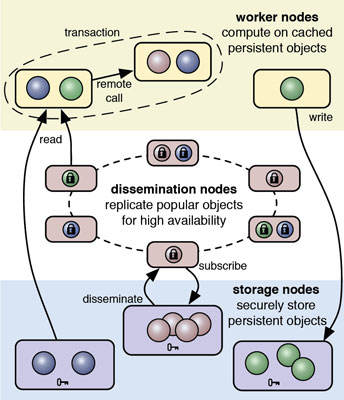Communications of the ACM
ACM TechNews
'fabric' Would Tighten the Weave of Online Security
Cornell University professors Fred Schneider and Andrew Myers are developing a way to incorporate security into the programming language used to write computer programs, so that systems are protected from the beginning. Until now, computer security has been reactive, Schneider says. "Our defenses improve only after they have been successfully penetrated," he says.
 Computer network nodes in Fabric pass around objects that contain data and program code, but the objects have built-inrules about what each node can do with them. The Fabric lan-guage requires programmers to include these rules and savesthem the work of writing code to enforce them.Credit: Andrew Myers / Cornell University Computer network nodes in Fabric pass around objects that contain data and program code, but the objects have built-inrules about what each node can do with them. The Fabric lan-guage requires programmers to include these rules and savesthem the work of writing code to enforce them.Credit: Andrew Myers / Cornell University |
Myers says most of what Fabric does is transparent to the programmer. "I think we can make life simpler and improve performance," he says.
From Cornell Chronicle
View Full Article
Abstracts Copyright © 2010 Information Inc., Bethesda, Maryland, USA 
No entries found